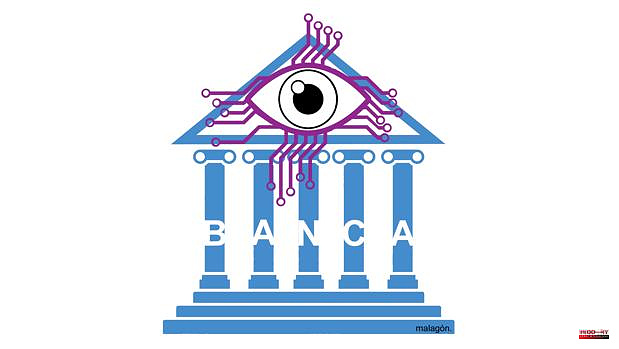Improve commercial actions, minimize bank fraud and reinforce risk management policies. These are three of the main opportunities presented by artificial intelligence and big data for banking, two technological advances that Spanish financial institutions have been implementing for a little less than a decade with the intention of improving their services. “Artificial intelligence is more important for banking than for other sectors because information is its raw material. And, precisely, this is a sector that has more information about its clients than others”, says Alberto Calles, partner in charge of the financial regulation area at PwC.
The use of data and artificial intelligence has served BBVA to provide its customers with a series of tools that allow them to improve their financial health. “Thanks to artificial intelligence and machine learning systems, the bank is able to detect situations that are out of the usual norm in the finances of its customers.
In these situations, we inform customers through alerts, to give them the opportunity to prepare for unforeseen events and resolve possible errors," says Francisco Maturana, CEO of the AI Factory, BBVA's advanced analytics center. This entity began to bet on the development of products based on artificial intelligence in 2014.
Artificial intelligence also makes it possible to implement machine learning strategies by analyzing past cases to learn from experience and find patterns that help predict future behavior. At Openbank, the Santander Group's online bank, machine learning makes it possible to establish predictive models to anticipate customer behavior and thus act in advance. "Thanks to our propensity algorithms in our product portfolio, we can design an appropriate communication plan for our clients, minimizing or increasing advertising campaigns for products that we know may be of interest to them," says Daniel Villatoro, chief data scientist at Openbank.
“The areas with the greatest potential impact of the use of artificial intelligence are, on the one hand, the services offered directly to customers. On the other hand, they can also significantly improve efficiency in fraud detection, optimize internal processes and operations, as well as ensure proper regulatory compliance," says BBVA's Maturana. “These algorithms are concerned with recommending the best product to the client to contract or discerning if any movement in their account is abnormal, among others, and all this always anonymously and guaranteeing the privacy of our clients”, comments Villatoro.
The great challenge for banks when launching artificial intelligence initiatives is to convince the regulator that the use of this technology is in line with current regulations, explains Calle, a partner at PwC. Artificial intelligence projects make it possible to obtain a huge amount of information from customers, so the challenge lies, for example, in explaining to the regulator that these procedures are in line with the data collection requirements to evaluate the granting of a loan .
“On the one hand, in Europe, thanks to the general data protection regulation, we have taken a protectionist attitude towards the privacy of individuals. On the other hand, in countries with a strong investment in research into this type of technique (such as the US or China), the management of customer data is much more liberal and therefore companies are taking advantage of this advantage to create new personalized services”, says Villatoro, from Openbank.
This dichotomy is generating a risk in the development of artificial intelligence that is known as "two-speed", that is, there are those who have more protectionist regulations and those who have more lax ones. "It is necessary to work together with the authorities in the knowledge and understanding of artificial intelligence models, and thus avoid an excessively prudent vision that limits their use," says the Spanish Banking Association in statements to ABC.
Another challenge lies in improving the operating capacity of financial institutions in order to integrate the latest advances in artificial intelligence into their services. “The evolution of natural language processing with advances in language comprehension and generation models, such as GPT-3, open up a world of possibilities to help classify and respond quickly to clients. Therefore, we have the challenge ahead of us to properly integrate these new capabilities," says Maturana, from BBVA AI Factory.
According to data from the European Banking Authority, 64% of financial institutions had projects based on data and advanced analytical tools in 2019. This percentage shows the rapid advance that projects based on this technology are having among the banks of the continent. "The development and application of models based on data management and artificial intelligence are already, at present, fundamental elements to improve financial services", says the Spanish Banking Association about the weight that this technology has for the future of banking
Calle, from PwC, considers that in comparative terms with European entities, Spanish banking stands out as one of the most advanced in the use of artificial intelligence technology. "There is still a long way to go, but Spanish banking is quite advanced in this area," says Calle, who also highlights the role of Spanish banks as one of the entities with the greatest digitization of their banking services.
The most common use that artificial intelligence has had in banking is in customer credit evaluation processes, known as 'credit scoring' in English. Financial entities have information about their clients that other sectors do not have, since it is in their accounts where they receive their payroll and direct their payments. The use of artificial intelligence allows banks to perform a quick analysis to determine the creditworthiness of customers. This translates into the development of innovative loan systems that work more efficiently for entities and for customers.
2












